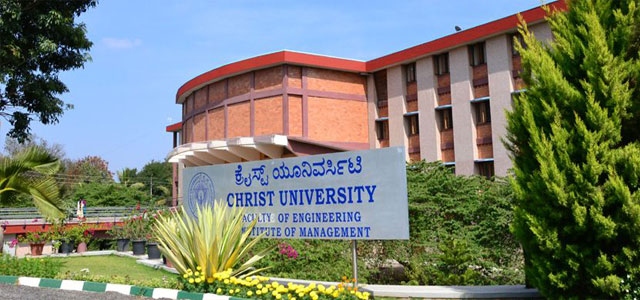CHRIST UNIVERSITY MSC ACTUARIAL SCIENCE COURSE OVERVIEW
The postgraduate course focuses on the technical and practical application of analytical abilities, theories, and concepts to business processes. It is an interdisciplinary subject involving Mathematics, Statistics, Economics, Accounts, and Finance. It covers topics related to risk in insurance, finance-based industries, accountancy, corporate finance, economics, risk management, derivatives, insurance, micro and macroeconomics, probability theory, and mathematical statistics. Candidates will have diverse knowledge about the diverse applications of mathematical and statistical methods after successful completion of the course.
The course aims to develop mathematical ability and abstract reasoning in students. The course is strengthened further by a strong academic foundation, experienced faculty, and excellent infrastructure. The Placement Cell encourages fresh talent and provides multiple career opportunities in top companies and organizations.
Candidates who take up the MSc Actuarial Science course in Christ University Bangalore will have diverse knowledge about the multiple applications of mathematical and statistical methods in risk management, property, accounts, industries, manufacture, financial services, insurance, and investment.
Skills like project management, logical reasoning, team work, planning and execution, organization, analytical reasoning, decision-making are enhanced through tools like case studies, presentations, webinars, seminars, internships, market analysis with experts, projects, workshops, and guest lectures included in MSc Actuarial Science in Christ University.
DURATION OF MSC ACTUARIAL SCIENCE COURSE IN CHRIST UNIVERSITY
- 2 years (4 semesters)
- Full time, Postgraduate Programme
AFFILIATION & APPROVALS
- Government of India
- Deemed-to-be University
- Accredited by NAAC
- Approved by UGC
PROGRAM OBJECTIVES
- To provide a strong foundation in Actuarial Science and its many applications
- To create graduates who can analyze real-time problems by applying continuous reflective learning techniques
- To provide practical experience and exposure so that candidates can design and develop immediate solutions through scientific integrity and objectivity
- To provide an environment of adaptability and continuous learning
- To develop and enhance skills like analysis, problem-solving, and leadership
- To integrate the concepts of professional, ethical, and social values to ensure quality research and develop solutions to social problems
- To understand the necessity of the judicious use of mathematical and statistical techniques for the benefit of the society and environment
- To enhance competency and employability
PROGRAM OUTCOME OF CHRIST UNIVERSITY MSC ACTUARIAL SCIENCE
- Graduates with the ability to understand and apply the fundamental concepts of Actuarial Science and its many applications
- Graduates who can analyze real-time problems by applying continuous reflective learning techniques
- Graduates with the ability to design and develop immediate solutions through scientific integrity and objectivity
- Graduates who can engage in adaptability and continuous learning
- Graduates who have excellent analysis, problem-solving, and leadership skills
- Graduates who can integrate professional, ethical, and social values to ensure quality research
- Graduates who can understand the necessity of the judicious use of mathematical and statistical techniques for the society and environment
- Graduates who are competent and employable
ELIGIBILITY OF MSC ACTUARIAL SCIENCE IN CHRIST UNIVERSITY
- Minimum 60% aggregate in BSc Mathematics/Statistics, BA Economics, or BCom from a recognized Board in India
- Candidates with final semester/year examinations in March-May 2021 are eligible to apply
IMPORTANT DATE
Admission open - 10 December 2020
Admission close - 31 May 2021
FEE STRUCTURE FOR 2021
The fees structure for MSc Actuarial Science in Christ University can be summarized as:
Admission Registration: ₹5000
|
Karnataka |
Other States |
NRI |
SAARC/AFRICA/ OCI/PIO/ASIAN |
Other Foreign Nationals | |
|---|---|---|---|---|---|
|
First Year (Semester I, II) |
₹176500 |
₹186500 |
₹255000 |
$ 5000 |
$ 5500 |
|
Second Year (Semester III, IV) | ₹176500 | ₹186500 | ₹255000 | $ 5000 | $ 5500 |
APPLICATION PROCESS OF MSC ACTUARIAL SCIENCE IN CHRIST UNIVERSITY FOR 2021
Candidates frequently wonder what is the admission procedure for MSc Actuarial Science in Christ University? This can be summarized as:
- The candidates must apply online when the applications are available on the University website https://appstat.christuniversity.in
- Register with Name, Email ID and Password
- Fill all the information that is required
- Submit the Application Form
- Make payment using card and click on Submit
- A 9-digit Application Number will be generated
- Applications close approximately 1 week before the scheduled selection process
- Selection Process - Application Form printout, original documents and a set of photocopies on the allotted date, time and venue mentioned on the Admit Card
Required Documents:
- Copy of Class 10, Class 11/ 12, and Degree Marks Card
- Transfer Certificate of Class 12
- Migration Certificate of Class 12 (except Karnataka state board applicants)
- Copy of valid ID proof (Aadhar Card/Aadhar Enrolment Receipt/PAN Card/Voter ID)
- PIO/OCI/SAARC/AFRICA/ASEA /OTHER FOREIGN NATIONALS Categories must send the required supporting documents – Copy of Passport, Copy of PIO/OCI Card, Copy of Degree Marks Cards)
- Baptism Certificate from the Parish Priest/Pastor for Karnataka Christian Students
- Recent passport size photograph (with white background)
ADMISSION FOR INTERNATIONAL STUDENTS
- The International Student Category includes Foreign Citizens/PIO Card Holders/OCI (Dual Citizens)
- The candidates from non-English speaking countries should produce evidence of passing the qualifying examination in English medium or have IELTS score 6.0/TOEFL (paper) 550/TOEFL (computer) of 213/TOEFL (IBT) of 79 scores
- Application Process – Direct Mode Application/Online Application Form
- The candidates will have to pay the International Student Category Fee
ADMISSION FOR NRI STUDENTS
- The candidates will have to pay the NRI Fee
- Foreign Venues for Selection Process: Kuwait and Dubai (UAE) and Doha (Qatar)
- Admission is based on academic performance and Selection
ADMISSION PROCESS FOR MSC ACTUARIAL SCIENCE IN CHRIST UNIVERSITY FOR 2021
Candidates frequently ask what is the admission process for the MSc Actuarial Science programme at Christ University Bangalore? The Admission Process includes:
- Selection Process: Skill Assessment, Personal Interview, and Academic Performance of Class 10, Class 11/12, and Degree
- Selection Process results will be available on https://appstat.christuniversity.in
- Selected candidates will receive an E-Admission Letter
- The candidates must choose the preferred date and time from available options for the Admission Process
- The Fee payment has to be made through the online mode
- Presence of the candidate, original documents, and passport photograph of the candidate are mandatory
- Two copies of the Online Payment Receipt are mandatory
- All admitted students must open an account at South Indian Bank, CHRIST (Deemed to be University) Branch
MISCELLANEOUS INFORMATION
- A common question frequently asked by candidates is how can get direct admission for MSc Actuarial Science in Christ University? Christ University does not collect any type of Donation Fee
- If the Application Form is incomplete or incorrect, the University Management has the right to reject it
- Do not send any original documents through post or courier
- Ignorance of the Terms, Conditions and Guidelines will not be considered as an excuse
- There may be a periodic increase in Tuition Fees to meet the rise in costs
- Admitted students who require Bank Loan will be provided a recommendation letter on request
- The decision of the University Management and Admission Committee is final and binding
SYLLABUS FOR MSC ACTUARIAL SCIENCE IN CHRIST UNIVERSITY
| Year | Semester | Subject |
|---|---|---|
| Year I | Semester I |
|
| Semester II |
| |
| Year II | Semester III |
|
| Semester IV |
|
OPEN ELECTIVES
Odd Semester:
- First Course in Statistics using SPSS
- Introduction to Drug Development and Base SAS
Even Semester:
- Statistics for Data Analysis
- Advanced SAS Programming
CAREER SCOPE AFTER MSC ACTUARIAL SCIENCE IN CHRIST UNIVERSITY BANGALORE
There are plenty of career and job opportunities available in government and private companies and organizations for MSc Actuarial Science graduates.
Potential career roles are:
- Lecturer/Professor
- Actuary Accountant
- Auditor
- Budget Analyst
- Cost Estimator
- Economist
- Financial Analyst
- Risk Manager
- Financial Specialist
- Consultant
- Investment Professional
- Statistician
- Mathematician
- Economist
- Accountant
- Financial Analyst
- Business Analyst
- Consultant
- Biostatistician
- Research Associate
- Demographer
- Entrepreneur
- Process Analyst
- Management Analyst
- Predictive Modeler
- Quantitative Analyst
Popular companies that recruit MSc Actuarial Science graduates are:
- HCL
- Wipro
- Oracle
- Mindtree
- Max Bupa Health Insurance
- PricewaterhouseCoopers
- Tata Consultancy Services
- HP
- Dell
- Intel
- Siemens
- Bosch
- Deloitte
- Wipro
- Ernst and Young
- KPMG
- Kotak Mahindra Insurance
- Honeywell
- Apple
- ITC Infotech
- Infosys
- Cognizant
- Accenture
- IBM
The average salary package for MSc Actuarial Science graduates is around 2.5 LPA to 7 LPA. The salary varies according to experience, specializations, professional certifications, and skills. The lowest salary package recorded was 2.5 LPA for fresh graduates and Trainees, and the highest salary package recorded was 25 LPA for Risk Managers and Consultants.
LOCATION
Hosur Road, Bangalore

